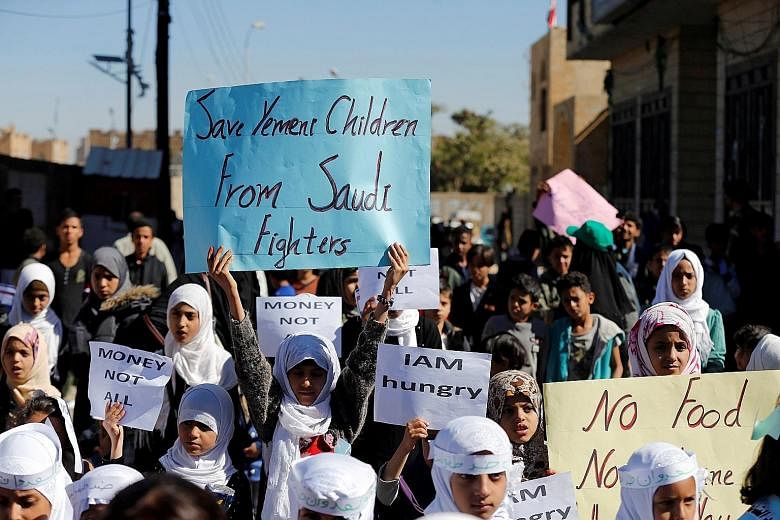The scale of this year's global humanitarian crises is perhaps best measured by calls for aid: Early this month, the United Nations asked for a record US$22.5 billion (S$30 billion) to support 91 million vulnerable people across the world - a number equivalent to the populations of Myanmar, Malaysia and Singapore combined.
Sadly, the worst situations have been playing out for so long in the African continent and the Middle East that some no longer make headlines. The UN's Office for the Coordination of Humanitarian Affairs singled out places like Nigeria, South Sudan and the Syrian region.
Two conflicts escalated dramatically this year - one that saw the local population expelled and the other that saw it trapped.
In Yemen, the locals are suffering while a Saudi Arabia-led coalition tries to bomb out the powerful Houthi rebels in the west as part of its shadow war against Iran. But it was Riyadh's blockade around Yemen that caused an unusually blunt UN Secretary-General Antonio Guterres to call it a "stupid war".
Saudi Arabia tightened the blockade after a missile fired by the Houthi on Nov 4 was shot down near Riyadh's airport. Saudi Arabia's crown prince accused Iran , its regional rival, of supplying missiles to the Houthi. Entry points by air, sea and land were sealed in the import-dependent Yemen, causing an outcry from aid agencies fearing famine. Weeks later, Riyadh loosened the noose, but only just.
The conflict has already killed more than 10,000 people and left one million afflicted with cholera. Some 400,000 children in Yemen are suffering from severe acute malnutrition, according to the World Health Organisation (WHO).
Even the United States, which backs the Saudi-led coalition, has pressed Riyadh to lift the blockade.
Closer to home, a military crackdown in the north-western corner of Myanmar caused over 600,000 Rohingya Muslims to flee to neighbouring Bangladesh, a displacement many fear would be permanent. Myanmar rejects the Rohingya as "Bengali" migrants imported by the British colonial authorities.
Communal tensions in poverty-stricken Rakhine state had already displaced more than 100,000 people and created apartheid-like conditions for the Rohingya, before Rohingya militants attacked 30 police posts and a military base in August.
As military "clearance" operations ensued, entire Rohingya villages were burnt to the ground. Stories emerging from the refugees who crossed into Bangladesh bore horrifying similarities: They were shot, slashed and gang-raped, and forced to witness the torture of their relatives. Allegations of "ethnic cleansing" have only caused mainstream Myanmar society to close ranks with the military.
Over in Bangladesh's Cox's Bazar, which now shelters over 800,000 Rohingya, refugees trying to recover from bullet wounds and cervical lacerations now face the threat of epidemics. As aid agencies race to erect safe and sanitary shelters in overcrowded conditions, doctors fear disease will sweep through what is probably the largest refugee settlement in the world.
On Dec 6, the WHO sounded the alarm over a diphtheria outbreak. Five days later, the number of probable cases had grown to 449, out of which nine patients died, the International Organisation for Migration revealed. Both organisations warned that the actual number of people infected could be far higher.

